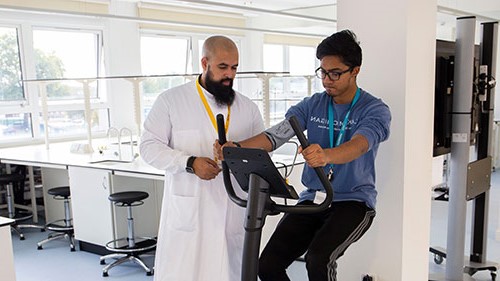Search
Applied Psychology BSc (Hons)
Study level: UndergraduateHNC/HND courses

Psychology is the study of the mind and human behaviour. Applied psychology places particular emphasis on its application in real-life and clinical contexts.
Course features
Course option
Year of entry
Location
CU London (Dagenham, London)
Study mode
Full-time
Sandwich
Duration
4 years sandwich
3 year - Degree
2 year - HND
1 year - HNC
UCAS codes
C810 / C811 / C812
Start date
January 2026
March 2026
May 2026
June 2026
Course overview
The degree course aims to provide you with a solid grounding for building a career in psychology-related disciplines.
Vocational modules allow you to understand how the key theories of psychology are applied in the professional context, and the course explores the use of psychology in areas such as health, education, sport, forensic, clinical and the law.
This allows you to learn about psychology in practice from different perspectives. The course aims to offer you the opportunity to gain real-world exposure across the course through engagement with a variety of psychologists from different fields, enhanced with visits and guest speakers (subject to availability)2.
Why you should study this course
- This course aims to provide you with an understanding of the disciplines found within psychology and an awareness of how these are used when working with clients.
- Opportunity to undertake an optional placement or study abroad year2.
What you'll study
We regularly review our course content, to make it relevant and current for the benefit of our students. For these reasons, course modules may be updated.
How you'll learn
This course is available as a full-time three-year or optional four-year sandwich course, where you undertake a work placement or study year in a related field2.
Teaching contact hours
As a full-time undergraduate student, you will study modules totalling 120 credits each academic year. A typical 20 credit module requires a total of 200 hours study. This is made up of teaching contact hours, guided and independent study.
Teaching hours:
Teaching hours vary depending on year of study and due to module selection. During your first year you can expect 15-18 teaching hours each week. You will also have the option to attend optional sessions including time with a progress coach or to meet with staff for advice and feedback. As you progress through your studies, teaching hours may reduce.
Guided and independent study:
Throughout your studies, you will be expected to spend time in guided and independent study to make up the required study hours per module. You’ll be digging deeper into topics, review what you’ve learned and complete assignments. This can be completed around your personal commitments. As you progress through your studies, you’ll spend more time in independent study.
Online learning:
As an innovative university, we use different teaching methods including online tools and emerging technologies. So, some of your teaching hours and assessments may be delivered online.
Assessment
The learning outcomes of modules, assignments and projects will be clearly stated. Your work will be marked according to how well you achieve these learning outcomes and your final feedback will refer to each outcome, as well as providing an overall percentage grade.
Assessment methods vary and may include: practical class and project performance, written practical reports, project thesis, oral presentations, tutorial tasks and assessments which take place at the end of each six-week block.
The Coventry University Group assessment strategy ensures that our courses are fairly assessed and allows us to monitor student progression towards achieving the intended learning outcomes.
Entry requirements
Typical entry requirements:
Fees and funding
| Student | Full-time | Part-time |
|---|---|---|
| UK, Ireland*, Channel Islands or Isle of Man | £9,535 per year | Not available |
| EU | £9,535 per year with EU Support Bursary** £14,800 per year without EU Support Bursary** |
Not available |
| International | £14,800 per year | Not available |
If you choose to study this course with a professional placement2 or study abroad year, you will need to pay a tuition fee3 to cover your academic support throughout your placement year. Students commencing their professional placement in the academic year 2027/28 will pay £1,500 if they are paying UK fees, or £1,800 if they are paying international fees.
For advice and guidance on tuition fees and student loans visit our undergraduate finance page and see the university’s Tuition Fee and Refund Terms and Conditions.
The University will charge the tuition fees that are stated in the above table for the first Academic Year of study. The University will review tuition fees each year. For UK (home) students, if Parliament permits an increase in tuition fees, the university may increase fees for each subsequent year of study in line with any such changes. Note that any increase is expected to be in line with inflation.
If you choose to study this course with a professional placement, the University will charge the tuition fees stated above for those on a placement during Academic Year 2027/28. The University will review professional placement tuition fees each year. For UK (home) students, the University may increase fees for each subsequent year of study, but such that it will be no more than 5% above inflation.
For international students, we may increase fees each year, but such increases will be no more than 5% above inflation. If you defer your course start date or have to extend your studies beyond the normal duration of the course (e.g. to repeat a year or resit examinations) the University reserves the right to charge you fees at a higher rate and/or in accordance with any legislative changes during the additional period of study.
We offer a range of international scholarships to students all over the world. For more information, visit our international scholarships page.
Tuition fees cover the cost of your teaching, assessments, facilities and support services. There may be additional costs not covered by this fee such as accommodation and living costs, recommended reading books, stationery, printing and re-assessments should you need them.
The following are additional costs not included in the tuition fees:
- Any optional overseas field trips or visits: £400+ per trip.
- Any costs associated with securing, attending or completing a placement (whether in the UK or abroad).
*Irish student fees
The rights of Irish residents to study in the UK are preserved under the Common Travel Area arrangement. If you are an Irish student and meet the residency criteria, you can study in England, pay the same level of tuition fees as English students and utilise the Tuition Fee Loan.
**EU Support Bursary
Following the UK's exit from the European Union, we are offering financial support to all eligible EU students who wish to study an undergraduate or a postgraduate degree with us full-time. This bursary will be used to offset the cost of your tuition fees to bring them in line with that of UK students. Students studying a degree with a foundation year with us are not eligible for the bursary.
Facilities
CU London Dagenham campus is in the Civic Centre building and is easily accessible by road, bus and rail.
Campus facilities include:
- classrooms with interactive teaching capabilities
- comprehensive library and learning services
- study areas, laptops/open-access computers and social spaces
- student support and careers advice teams
- onsite free student parking.
Facilities are subject to availability. Access to some facilities (including some teaching and learning spaces) may vary from those advertised and/or may have reduced availability or restrictions where the university is following public authority guidance, decisions or orders.
Careers and opportunities
Studying psychology opens up a wealth of opportunities in a diverse and exciting range of fields that can lead to vast employment potential.
Through the analysis of psychology in real-life situations, you will develop key employability skills valued by employers. These include teamwork, independent working, presentation skills, role play, reflection and an ability to articulate complex ideas effectively. In this way, graduates are prepared for a future career in psychology as well as in other areas that require the many and varied skills that this course promotes.
On successful completion of your degree, you should be able to:
- critically evaluate the discipline of psychology, with the ability to systematically review and synthesize psychological knowledge, recognise the diversity of psychological functioning and the global, historical and cultural context of human experience
- structure and confidently articulate ideas and information to a range of different audiences, using professional standards and enterprise skills appropriate to the socio-cultural and global contexts and purpose of the communication
- critically evaluate psychological research paradigms, a range of qualitative and quantitative research methodologies, and analyse data, culminating in the successful execution of a research project complying with established ethical standards
- demonstrate a critical understanding of the applications of psychology and approach problem-solving in innovative and creative ways to explain and develop solutions to a range of real-world problems and global contexts
- show a deep understanding and high level of competency in a range of transferable skills, including analysis and interpretation of statistical and other forms of data, digital literacy skills, communicating effectively through scientific argument and the effective sourcing and utilization of ideas and evidence from a wide range of psychological and other scientific sources
- critically reflect on and be self-aware of the achievement of personal and group objectives whilst developing introspection and autonomy in the application of learning.
Where our graduates work
Upon graduation, there are a range of career possibilities. You could continue onto postgraduate study, or other options may include becoming a researcher in psychology or careers in an alternate field e.g. occupations within social and welfare settings, law and business, HR and marketing, or childcare, education and health professions. Depending on which type of psychology you choose to research in your final year project, you could gain real insights into fields including law, health, business, education, counselling, sport and leisure.
The graduate destinations listed above illustrate potential career paths. You may need to gain additional qualifications or practical experience, pass professional examinations, complete training, cover associated costs and meet specific visa or immigration requirements to secure employment in these fields.
How to apply
You may also like










